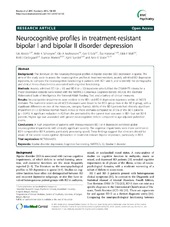Neurocognitive profiles in treatment-resistant bipolar I and bipolar II disorder depression
Kessler, Ute; Schøyen, Helle Kristine; Andreassen, Ole Andreas; Eide, Geir Egil; Hammar, Åsa; Malt, Ulrik Fredrik; Ødegaard, Ketil Joachim; Morken, Gunnar; Sundet, Kjetil Søren; Vaaler, Arne Einar
Peer reviewed, Journal article
Published version

Åpne
Permanent lenke
https://hdl.handle.net/1956/10760Utgivelsesdato
2013-04-04Metadata
Vis full innførselSamlinger
Originalversjon
https://doi.org/10.1186/1471-244x-13-105Sammendrag
Background The literature on the neuropsychological profiles in Bipolar disorder (BD) depression is sparse. The aims of the study were to assess the neurocognitive profiles in treatment-resistant, acutely admitted BD depression inpatients, to compare the neurocognitive functioning in patients with BD I and II, and to identify the demographic and clinical illness characteristics associated with cognitive functioning. Methods Acutely admitted BD I (n = 19) and BD II (n = 32) inpatients who fulfilled the DSM-IV-TR criteria for a major depressive episode were tested with the MATRICS Consensus Cognitive Battery (MCCB), the Wechsler Abbreviated Scale of Intelligence, the National Adult Reading Test, and a battery of clinical measures. Results Neurocognitive impairments were evident in the BD I and BD II depression inpatients within all MCCB domains. The numerical scores on all MCCB-measures were lower in the BD I group than in the BD II group, with a significant difference on one of the measures, category fluency. 68.4% of the BD I patients had clinically significant impairment (>1.5 SD below normal mean) in two or more domains compared to 37.5% of the BD II patients (p = 0.045). A significant reduction in IQ from the premorbid to the current level was seen in BD I but not BD II patients. Higher age was associated with greater neurocognitive deficits compared to age-adjusted published norms. Conclusions A high proportion of patients with therapy-resistant BD I or II depression exhibited global neurocognitive impairments with clinically significant severity. The cognitive impairments were more common in BD I compared to BD II patients, particularly processing speed. These findings suggest that clinicians should be aware of the severe neurocognitive dysfunction in treatment-resistant bipolar depression, particularly in BD I.
